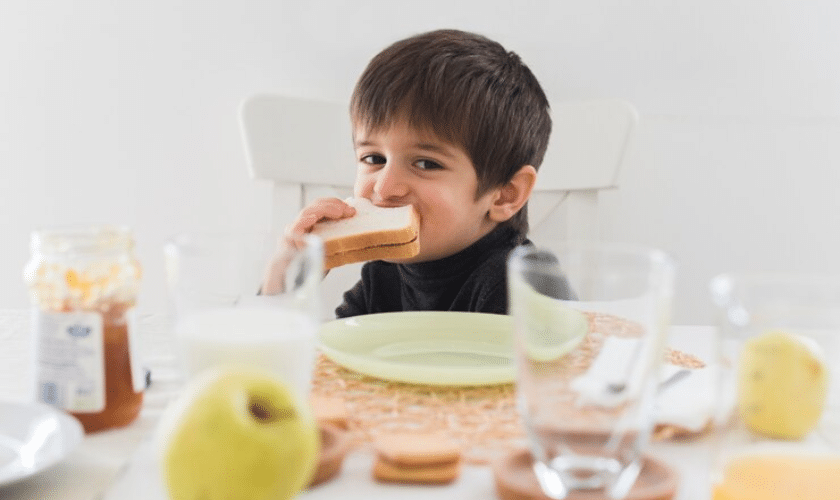As a parent, ensuring your child’s well-being is a top priority. While you focus on their overall health, it’s crucial not to overlook the impact of diet on their dental hygiene. The foods and drinks your child consumes play a significant role in the health of their teeth. This blog will guide you through the detrimental culprits that can damage your kid’s teeth and offer insights into what you can do to protect their precious smiles.
The Sneaky Culprits: Foods and Drinks That Harm Kids’ Teeth
Sugary Snacks: The Silent Saboteurs
You might not realize it, but those seemingly innocent gummy snacks and candies are a dental nightmare for your child. High sugar content feeds harmful bacteria in the mouth, leading to plaque buildup and, eventually, tooth decay. Swap out sugary treats for healthier alternatives like fruit slices or yogurt.
Acidic Fruits and Juices: The Erosion Agents
While fruits are generally healthy, some can be acidic and erosive to tooth enamel. Citrus fruits and juices, while rich in vitamin C, can contribute to enamel erosion over time. Limit the intake of acidic foods and encourage your child to drink water after consuming them to help neutralize the acid.
Carbonated Beverages: The Fizzy Foes
Sodas and other carbonated drinks are not only loaded with sugars but also contain acids that can weaken tooth enamel. The double whammy of sugar and acidity makes these beverages a significant threat to your child’s dental health. Opt for water, milk, or natural fruit juices as alternatives.
Sticky Snacks: The Adhesive Adversaries
Sticky snacks may seem harmless, but their adhesive nature poses a unique threat to your child’s dental health. Snacks like dried fruits, chewy granola bars, and certain types of candies tend to cling to the surfaces of teeth, creating an ideal environment for harmful bacteria to thrive. Here’s a closer look at why these seemingly innocent treats can be adversaries to your child’s precious smile:
Adhesion Leads to Prolonged Exposure
Sticky snacks adhere to the enamel on your child’s teeth, and unlike other foods that are quickly washed away by saliva, they linger. This prolonged exposure provides an opportunity for bacteria to feast on the sugars present in these snacks, leading to the production of acids that can erode tooth enamel.
Increased Risk of Cavities
As the bacteria multiply, they release acids that attack the tooth’s protective layer. Over time, this process can lead to the formation of cavities. The crevices and spaces between teeth, where sticky residue often accumulates, become particularly vulnerable areas for cavities to develop.
Challenges in Cleaning
The sticky texture of these snacks can make it challenging for your child to clean off their teeth through regular brushing alone. Even the most diligent brushers may struggle to reach every nook and cranny where these sticky remnants hide, leaving behind a potential breeding ground for dental issues.
Encourages Plaque Formation
The adhesion of sticky snacks not only fosters the growth of bacteria but also encourages the formation of plaque. Plaque is a sticky film of bacteria that accumulates on teeth and, if not properly removed, can harden into tartar, leading to gum disease and other oral health problems.
Starchy Foods: The Hidden Hazards
Crackers, chips, and other starchy snacks may not taste sweet, but they can be just as harmful. These foods break down into sugars during digestion, fueling the growth of bacteria in the mouth. Monitor your child’s intake of starchy snacks and balance it with a diverse range of healthier options.
Safeguarding Your Child’s Smile: Practical Tips
Now that you’re aware of the potential culprits, here are some practical tips to safeguard your child’s smile:
Encourage Regular Dental Hygiene: Instill good dental habits early on. Ensure your child brushes their teeth twice a day and flosses regularly to remove plaque and prevent cavities.
Choose Teeth-Friendly Snacks: Opt for snacks like crunchy fruits and vegetables that stimulate saliva production, helping to cleanse the mouth naturally.
Limit Sugary Treats: While occasional treats are okay, moderation is key. Set limits on sugary snacks and encourage healthier alternatives.
Promote Hydration with Water: Water is not only essential for overall health but also helps rinse away food particles and acids, protecting your child’s teeth.
Regular Dental Check-ups: Schedule regular dental check-ups for your child. Early detection of any dental issues can prevent them from escalating.
Your child’s smile is precious, and protecting it involves making informed choices about their diet. By being mindful of the foods and drinks discussed in this guide and implementing practical tips, you can ensure your child grows up with strong, healthy teeth. Remember, a little awareness today can lead to a lifetime of smiles tomorrow.
FAQs
1. How can I encourage my child to brush their teeth regularly?
To make brushing fun, consider using toothpaste with appealing flavors, letting your child choose their toothbrush, or turning tooth brushing into a family activity.
2. Are all fruits bad for my child’s teeth?
While some fruits can be acidic, they also provide essential nutrients. Encourage a balanced diet and ensure your child rinses their mouth with water after consuming acidic fruits.
3. Is it okay for my child to have occasional sugary treats?
Yes, occasional treats are acceptable. The key is moderation. Set limits, and ensure your child follows a good oral hygiene routine to counteract the effects.
4. Can chewing gum be beneficial for my child’s dental health?
Sugar-free gum, especially those with xylitol, can stimulate saliva production, which helps neutralize acids in the mouth and prevent tooth decay.
5. How often should my child visit the dentist?
Schedule regular dental check-ups at least twice a year, even if your child has no apparent dental issues. Early detection can prevent potential problems from worsening.




